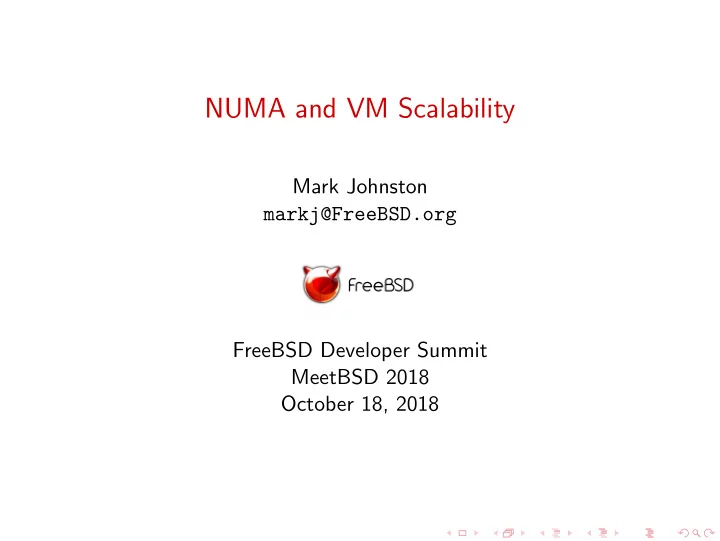

NUMA and VM Scalability Mark Johnston markj@FreeBSD.org FreeBSD Developer Summit MeetBSD 2018 October 18, 2018
Non-Uniform Memory Access Motivation ◮ Scalable multiprocessing ◮ Target commodity systems Assumptions ◮ CPU caches are coherent ◮ Small number of NUMA domains (usually 2 or 4) ◮ Low NUMA factor (20-50%) ◮ NUMA domains are balanced
OS Goals ◮ Balance resource (memory controller) utilization ◮ Sane default NUMA allocation policies ◮ Allow applications to declare intent ◮ DTRT for static allocations (per-CPU data, DMA, etc.) ◮ Handle local memory shortages gracefully
OS Support NUMA awareness: ◮ CPU scheduler ◮ cpuset(2) ◮ busdma(9) ◮ Memory allocators: UMA, malloc(9) , kmem malloc(9) , kstacks, etc. SMP scalability: ◮ Page allocator ◮ Page queues ◮ Buffer cache
FreeBSD History ◮ SRAT parser and vm phys domain awareness ◮ r210550 , r210552 (2010) ◮ First-touch allocation policy, useful with CPU pinning ◮ Changed to round-robin in r250601 (2013) ◮ Per-domain page queues ◮ r254065 (2013) ◮ projects/numa (2014) ◮ VM NUMA ALLOC , numactl(8) ◮ r285387 (2015) ◮ First attempt at user-configurable policies ◮ Included a SLIT parser, currently not used by the kernel
NUMA/Scalability project ◮ 2017/2018, many commits ◮ Work by Jeff Roberson, sponsored by Limelight, Netflix, Isilon ◮ Plumb int domain through various layers ◮ Define NUMA allocation policy abstraction ◮ Provide userland interface for specifying allocation policy ◮ Address VM and buffer cache bottlenecks
domainset(9) ◮ Structure defining a domain selection policy ◮ Immutable ◮ Iterator state is defined externally ( struct domainset ref ) ◮ Contains a pointer to a domainset ◮ Embedded in struct thread and vm object t ◮ vm domainset *() applies a domainset to an iterator ◮ Can restrict to a subset of system’s domains ◮ Some predefined policies can be used ◮ DOMAINSET PREF(1) : “Allocate from domain 1 or fall back” ◮ DOMAINSET RR() : Global round-robin
domainset(9) policies DOMAINSET POLICY ROUNDROBIN ◮ Cycles through domains: d = iter++ % ds->ds cnt ◮ 0, 1, 2, 3, 0, 1, 2, 3, 0, ... DOMAINSET POLICY FIRSTTOUCH ◮ Pick the domain of the current CPU: d = PCPU GET(domain) DOMAINSET POLICY PREFER ◮ Pick the domain specified in the policy: d = ds->ds prefer ◮ Fall back to round-robin when free pages are scarce DOMAINSET POLICY INTERLEAVE ◮ Domain is a function of the pindex ◮ Round-robin with a stride, for successive indices ◮ 0, 0, ..., 0, 1, 1, ..., 1, 0, 0, ... ◮ Superpage-friendly: use a stride of 512
vm domainset vm_domainset_iter_page_init(&di, obj, pindex, &domain, &flags); do { m = vm_page_alloc_domain(obj, pindex, domain, flags); if (m != NULL) break; } while (vm_domainset_iter_page(&di, obj, &domain) == 0); return (m);
Userland interface ◮ Domain selection policies integrated into cpuset(1) ◮ Each cpuset has an associated struct domainset ◮ Allows specification of a policy for a thread, process, jail ◮ cpuset -n rr:0,2 make buildworld ◮ cpuset -g -s 0 ◮ cpuset getdomain(2) , cpuset setdomain(2) ◮ Userland threads default to first-touch ◮ Domain selection overridden to preserve superpage reservations
Memory allocators (1) UMA, malloc(9) ◮ No policy at the caching layer (fast path) ◮ Default round-robin policy at the slab layer (zone iterator) ◮ UMA zone policy: UMA ZONE NUMA for first-touch ◮ uma zalloc domain(2) , malloc domain(2) kmem malloc(9) and friends ◮ Round-robin policy (thread iterator) ◮ Multiple vmem(9) arenas provide striping for superpages busdma(9) ◮ Bus can be queried for domain affinity ( PXM method) ◮ DMA tags cache local domain index ◮ DMA allocations use malloc domain(9) with local domain
Memory allocators (2) vm page alloc() and friends ◮ Source of user memory allocations (page faults, etc.) ◮ Not always under user control (e.g., libc.so ) ◮ Policy specified by VM object (may be absent), or thread ◮ vm page alloc domain() Kernel stacks ◮ Global round-robin policy (thread iterator) ◮ Kernel stacks are cached ◮ We can do better (e.g., ithread kstacks)
Low memory handling ◮ Each domain has page queues, page daemon, laundry thread ◮ Page domains are mostly independent ◮ Per-domain free page targets, laundry targets ◮ OOM kills occur only when all domains are depleted ◮ Does not work well if most of a domain is wired (e.g., by ARC) ◮ vm wait doms() : sleep until one of the specified domains has some free pages
Scalability improvements ◮ PID controller for free page target ◮ Split free page mutex and add per-CPU free page cache ◮ Fine-grained reservation locking ◮ Lockless page daemon wakeups and v free count updates ◮ Per-CPU v wire count accounting ◮ Page queue batching ◮ Lazy dequeue of wired pages ◮ Buffer cache sharding, locking improvements
Future Work NUMA: ◮ Non-x86 support (arm64 and powerpc64) ◮ Statistics collection ◮ libnuma, msetdomain(2) ◮ Static allocations ( pcpu(9) , kernel thread stacks, etc.) ◮ More affinity plumbing (per-mountpoint policy?) ◮ ZFS integration ◮ taskqueue(9) integration Scalability: ◮ Split user ( mlock(2) ) and kernel wired page accounting ◮ Lockless per-page queue state ◮ Lockless vm page hold() ◮ Improve PQ ACTIVE scalability in the page fault handler
Recommend
More recommend